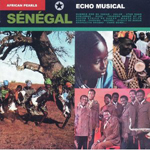|
|
 |
Dusted Reviews
Artist: V/A Album: African Pearls: Senegal - Echo Musical Label: Syllart Review date: Jun. 2, 2010 |

|
|
|
 |
The seventh volume of the African Pearls series presents popular music from Senegal in the 1970s. Musically, the era seems to have been a transitional one, when the dominant Afro-Cuban influence on Senegalese pop music brought to the port city of Dakar by seamen travelling from Cuba since the 1930s was quickly becoming just one of the many styles heard by Senegalese musicians. The 1970s featured Senegalese music merging with a huge array of U.S. funk, rock and soul, Sufi vocal styles and tonal systems common in Middle Eastern music. Add to this elements of traditional Senegalese dance rhythms and musical/narrative performances by griots (West African bards / wandering praise singers), performed by musicians from Senegal and other parts of Africa — perhaps in Dakar, perhaps in Paris — and this ain’t no encounter of some authentic, pure, “tradition.” It’s a rediscovery, or perhaps more accurately, a new discovery of “tradition” by a younger generation of Senegalese in the 1960s and ’70s who lived and loved the music of Jimi Hendrix and Santana and approached their roots as the new thing to do.
All this eventually adds up to an emerging genre called mbalax (mbalakh), a popular dance genre which Youssou N’Dour, along with his groups such as the Super Etoile de Dakar, and Omar Pene et Le Super Diamono, helped to make famous in the 1970s. Emphasizing the Senegalese side of things, these bands switched from English lyrics to Wolof, the most widely spoken language in Senegal. The Star Band de Dakar was one of the first to incorporate Senegalese tama drums into Afro Cuban rhythms. These artists, along with Gorom, Orchestra Baobab, Xalam and Le Sahel are included in this compilation, produced by Ibrahima Sylla.
The two-CD set provides ample evidence of the highly cosmopolitan and urban nature of a vibrant Senegalese music scene. It’s ill-conceived, then, that the packaging of the album is presented by an album cover that shows women wearing colorful headscarves and long skirts dancing around a baobab tree — especially when the compilation features no women in the bands, but does feature the electric guitar quite prominently (which would be much better off plugged into an outlet inside an urban dance club rather than a tree in the middle of an arid outdoor landscape). The title of the compilation — Écho Musical — also fails to do justice to a collection of original music that borrows from other places or groups no more and no less than any contemporary French or American pop group would have been doing. Calling the sounds of the Senegalese bands as “echoes” unfairly casts them as secondhand renditions of music from other centers (America, Cuba), with maybe a bit of local distortion.
In a curatorial sense, Écho Musical wants to make urban pop music into a world music relic of the past: some kind of curio of authentic African music. But the music doesn’t support such framing. The array of influences and interpretations of different styles suggests everything but a static jewel of “Africa.” Instead, it strongly suggests from the Senegalese side that Dakar runs on the same clock as other urban musical centers and is one powerful node in the network of transnational musical influences.
By Miki Kaneda
|







